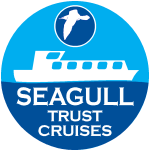Early Days
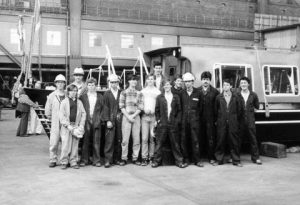 The idea of providing specially adapted boats to allow disabled people of all ages, especially children, to enjoy canals began in the 1970s – one scheme operated in England and one in Wales.
The idea of providing specially adapted boats to allow disabled people of all ages, especially children, to enjoy canals began in the 1970s – one scheme operated in England and one in Wales.
It was an activity supported by both the Inland Waterways Amenity Advisory Council (IWAAC), and Britsh Waterways as a way of making use of the canals while providing a valued service.
The Reverend Hugh Mackay, an active canal enthusiast, had been the minister of the Parish of Torphichen which the Union Canal runs through and he heard of this work. Along with Professor J.R. Hume, a member of the IWAAC, he set about recreating the idea in Scotland. Taking advice from the English scheme the Seagull Trust was formed on the 21st November 1978 – the name Seagull being used to reflect the idea of freedom from physical constraint.
Development
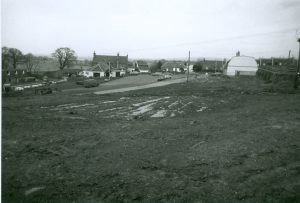 Although the Trust had no money, Rev. Hugh Mackay had been instrumental in restarting the Ancient Order of St John in Scotland in 1947. He approached the Order and they generously provided £10,00 for a boat and its running costs – the Order still supports the Trust today. The boat purchased was one no longer required by the English Trust, and it was renamed St John Crusader at Wester Hailes by the Duke of Hamilton in 1979.
Although the Trust had no money, Rev. Hugh Mackay had been instrumental in restarting the Ancient Order of St John in Scotland in 1947. He approached the Order and they generously provided £10,00 for a boat and its running costs – the Order still supports the Trust today. The boat purchased was one no longer required by the English Trust, and it was renamed St John Crusader at Wester Hailes by the Duke of Hamilton in 1979.
The problem of where to keep the boat was resolved by Ronnie Rusack who at that time was the landlord of the Bridge Inn at Ratho which was running a restaurant service on the Union canal. He took the boat under his wing and provided a booking service – he later became a Chairman of the Trust.
The Wider Role
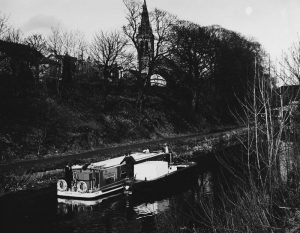 Hugh Mackay and some of the founders of the Trust were very keen to not only provide free canal cruising in Scotland for disabled people but also wanted to demonstrate the worth of the Lowland Scottish Canals. The team actively supported and were engaged in a number of projects to ‘reclaim’ a canal network that had fallen into disrepair. Projects supported included, dredging of the Union Canal at Falkirk and the Glasgow Canal Project – reopening most of the Forth & Clyde Canal between Kirkintilloch and Port Dundas.
Hugh Mackay and some of the founders of the Trust were very keen to not only provide free canal cruising in Scotland for disabled people but also wanted to demonstrate the worth of the Lowland Scottish Canals. The team actively supported and were engaged in a number of projects to ‘reclaim’ a canal network that had fallen into disrepair. Projects supported included, dredging of the Union Canal at Falkirk and the Glasgow Canal Project – reopening most of the Forth & Clyde Canal between Kirkintilloch and Port Dundas.
Meanwhile the charity continued to extend its own network to support the demand for free canal cruising. By the end of the 1980s there were bases at Ratho, Falkirk, Kirkintilloch and Highland Branch in Inverness, providing regular cruises as a significant part of the traffic on the Union, Forth & Clyde and Caledonian Canals.
The Trust continued to actively support the development of the canals, so when the Millennium Link was first discussed, their activities were a significant part of the arguments put forward for the worth of the project. The work of the Seagull Trust boats and bases allowed the canals to be shown in a very positive way to potential funders and supporters. The community support which had to be demonstrated to secure Millennium funding was generated in large measure by the activities of the Trust.
Objectives Realised
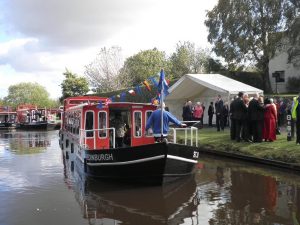 Now over forty years after the idea for the charity started, the objectives which seemed to be at the least, impossible in the late 1970s, have in so many ways been realised and much more besides. Had anyone said to the founding Trustees that the Seagull Trust would be operating from four bases across Scotland and that the Lowland Canals would be so extensively restored and navigable to vessels, it would have been taken with a pinch of salt; but all has been or is being accomplished. Facts and figures are the least of what Seagull Trust Cruises is about. It has provided a focus for an enormous amount of caring concern, it has given pleasure to tens of thousands of people whose lives are restricted in different ways, and it has become part of the Scottish life in a manner far beyond the expectations of the pioneers.
Now over forty years after the idea for the charity started, the objectives which seemed to be at the least, impossible in the late 1970s, have in so many ways been realised and much more besides. Had anyone said to the founding Trustees that the Seagull Trust would be operating from four bases across Scotland and that the Lowland Canals would be so extensively restored and navigable to vessels, it would have been taken with a pinch of salt; but all has been or is being accomplished. Facts and figures are the least of what Seagull Trust Cruises is about. It has provided a focus for an enormous amount of caring concern, it has given pleasure to tens of thousands of people whose lives are restricted in different ways, and it has become part of the Scottish life in a manner far beyond the expectations of the pioneers.
(This historical overview is based on an article in the Seagull Trust Newsletter of December 1999 by Prof. J.R. Hume OBE Hon President.)
The following pipe march – The Seagull Trust – was first played in public at the 25th anniversary dinner and thereafter at the naming of St John’s Edinburgh.
For further information on the history of Seagull Trust Cruises go to the History of The Seagull Trust 1978-2015 Based on the archives of Ronnie Rusack MBE, landlord of the Bridge Inn Ratho 1972-2005, founding member, honorary life member and former Chairman of the Trust (2005-2013).
